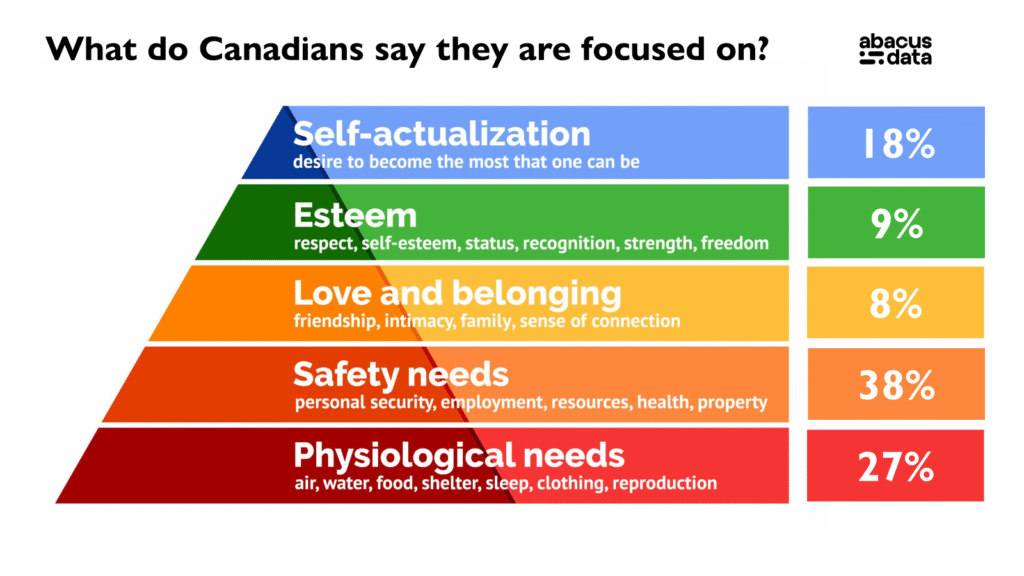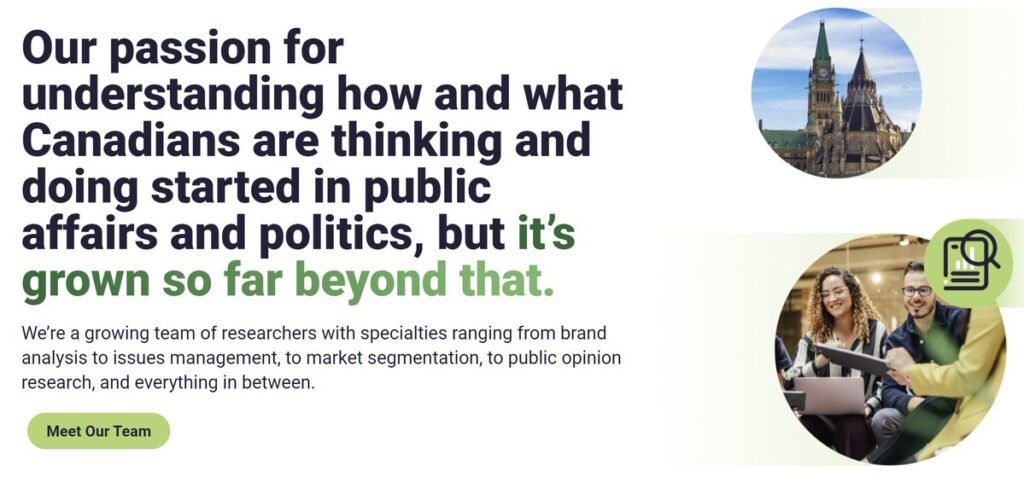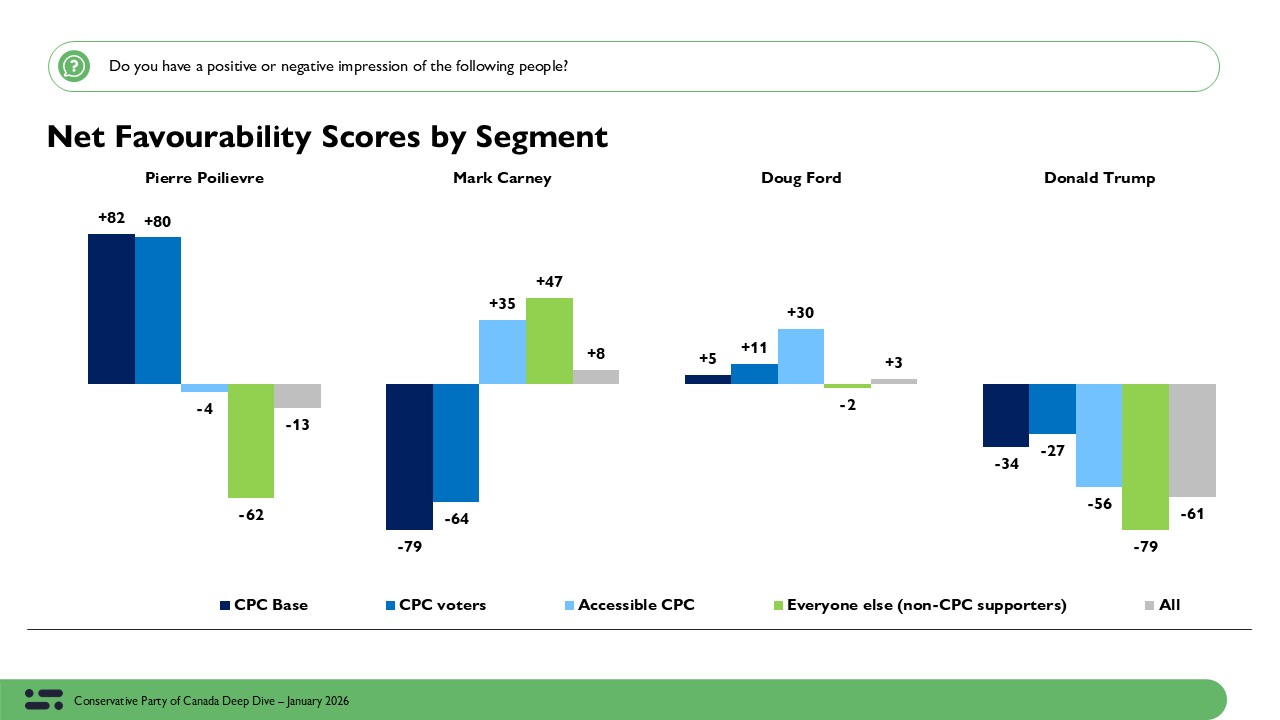Outlook 2026 – The Age of Reassurance Is Here. Are you ready?
November 13, 2025
I’m always thinking about how the broader context—economic, political, cultural—shapes what people think, feel, and do. Public opinion doesn’t drift in a vacuum. It responds to the environment people inhabit: the prices they see, the news they scroll, the security they feel.
That’s why 2026 matters. The coming year will not be defined by crisis, but by adjustment. And while it’s about two months away, now is a good time to ask yourself: Are you ready to respond to what’s coming? Do you know what the unmet needs of your customers, workers, or audiences are?
Inflation is mostly tamed, rates are coming down, and the global economy is finding its footing after years of shocks and constant uncertainty. Yet the feeling among Canadians isn’t relief,it’s caution.
Growth will likely hover around 1%, unemployment will likely rise modestly, and trade tensions will persist. Energy-rich regions will fare better than manufacturing-heavy provinces exposed to tariffs and slower U.S. demand. Governments will focus on deficit control, while households still digest higher mortgage payments and rent hikes.
The result is an economy that’s stable on paper but precarious in feeling.
That’s the defining frame for 2026: the precarity mindset -> a lingering sense of vulnerability that shapes how people consume, work, and vote. It’s not panic or despair. It’s a quiet recalibration toward caution, self-protection, and control. And it will influence every aspect of behaviour next year.
Last week, when asked where their focus is today, Canadians overwhelmingly placed themselves lower on Maslow’s hierarchy of needs. According to our findings, 38% said they are primarily focused on safety needs—things like personal security, employment stability, and access to health resources—while 27% are still focused on basic physiological needs such as food, housing, and rest.
Only a small share are thinking about higher-level goals: 18% say they’re focused on self-actualization, 9% on esteem, and 8% on love and belonging.
Together, the data show that two-thirds of Canadians are preoccupied with survival and security, not growth or self-expression, underscoring just how deep the precarity mindset runs.

1. If people still feel uncertain about their footing, consumption becomes cautious and values-driven.
Consumers are no longer reacting to crisis, they’re adapting to constraint. The trauma of rapid inflation, rate shocks, and housing scarcity has permanently reshaped how Canadians approach money. Even as prices stabilize, trust in the economy hasn’t recovered.
Households are choosing stability over spontaneity. They’ve internalized the volatility of recent years and are planning for the next shock before it arrives. This is the essence of the precarity mindset: acting as though security must be earned every day because it can be lost overnight.
That mindset produces two distinct shifts in behaviour:
Frugality as identity. Canadians no longer view cutting back as failure; they see it as smart strategy. Being careful is a badge of competence. They save selectively, scrutinize purchases, and reward brands that help them feel in control rather than indulgent.
Trust as currency. After “greedflation” narratives and corporate price-gouging debates, people read motives into markets. They’re more skeptical, more attuned to fairness, and more loyal to brands that mirror their constraints. Authenticity isn’t a marketing cliché, it’s a survival signal.
Marketers should expect the spending mood of 2026 to remain subdued but rational. People will still spend, but every transaction will need to feel justified. The emotional calculus of purchasing is now about reassurance: “Am I making the right choice for my family, my finances, my values?”
Implication: Campaigns that promise control, competence, and value will outperform those selling escape or excess. The brands that succeed won’t be the flashiest—they’ll be the ones that help people feel stable in an unstable world.
2. If work no longer guarantees security, workers seek reassurance, not revolution.
The labour market of 2026 will look normal, until you look closer. Job growth will slow, unemployment will rise toward 7%, and automation and AI will quietly reshape roles. The great resignation is very much over, replaced by what might be called the great recalibration.
Workers have traded ambition for assurance. They’re no longer searching for employers that “inspire” them, but for ones that won’t surprise them. The precarity mindset shows up here too: predictability is the new perk.
Three dynamics are at play:
Security over status. People are less interested in fast promotions and more interested in staying employable. They’re asking: “Will my skills still matter?” rather than “Will I get a bigger title?” Employers that invest in reskilling and signal long-term commitment will attract loyalty even in a soft market.
Flexibility as non-negotiable. Hybrid work has become a normalized right. Rolling it back feels like breaking a promise. In an era of economic uncertainty, flexibility equals trust—and trust equals retention.
Belonging through stability. After years of churn, people crave psychological safety. They want calm leadership, clear direction, and empathetic communication. A chaotic culture, even a high-performing one, feels risky in a world that already feels uncertain.
For employers, the opportunity lies in tone and transparency. Workers aren’t demanding perfection; they’re asking for honesty. They’ll accept tough news if it’s delivered with clarity. The companies that succeed will be those that steady their people, not those that dazzle them.
Implication: The employee value proposition must evolve from aspiration (“grow with us”) to reassurance (“we’ll grow with you”). Stability is the new status symbol.
3. If economic uncertainty persists, politics becomes a search for control.
The political expression of the precarity mindset is already visible: low trust, high frustration, and an electorate hungry for someone who can make things feel manageable again.
Even as inflation falls, few Canadians feel better off. Mortgage renewals, grocery bills, and rent hikes anchor perceptions in scarcity. Trump fuels uncertainty about employment, investment values, and longer term stability. People measure the economy through their anxiety, not through GDP.
That disconnect is why 2026 will likely continue to reward political narratives of control, over borders, budgets, housing, and trade. Tariffs, supply-chain reshoring, and “Made in Canada” messaging tap into a deep desire for stability and self-sufficiency. They give voters something to hold onto in a world that feels externally driven.
But the same dynamic fuels cynicism. Many Canadians no longer believe institutions—governments, banks, corporations—are acting in their interest. When people feel precarious, they become more sensitive to fairness and more skeptical of expertise. That’s fertile ground for populism, but also for policy creativity: solutions that feel protective rather than prescriptive.
For government relations professionals, the challenge is to connect ambition with empathy. Arguments rooted in macroeconomic efficiency—growth, productivity, competitiveness—will fall flat unless they also speak to emotional security and improved micro-economic well being.
Implication: Successful advocacy in 2026 will be about shared protection. Policies that help people feel buffered from volatility—on housing, jobs, or affordability—will earn support even if they’re complex. The story that wins is not “growth for growth’s sake,” but “stability that benefits you.”
The connective thread: reassurance is the new aspiration.
The economy of 2026 won’t likely be defined by crisis, but by fragility. Beneath the surface of stable indicators runs a current of quiet vulnerability. Canadians have learned that shocks are no longer exceptional, they’re structural and constant. And that realization is reshaping the way they think, buy, work, and vote.
For marketers, that means speaking to control, not consumption.
For employers, it means building confidence, not just culture.
For policymakers and communicators, it means offering reassurance that feels earned, not imposed.
This is the era of the precarity mindset – a worldview born from uncertainty and sustained by vigilance. People don’t expect the future to get worse; they just don’t trust it to get better without effort.
The opportunity for leaders is to meet that mood with honesty and empathy. To move beyond promises of growth and speak instead to the deeper emotional need of the moment: to feel safe enough to hope again.
Message me now to learn more on how we can help you connect with your audiences, build out a strategy to lead, or engage your audiences, board, senior leadership team in a briefing about this work.
ABOUT ABACUS DATA
We are Canada’s most sought-after, influential, and impactful polling and market research firm. We are hired by many of North America’s most respected and influential brands and organizations.
We use the latest technology, sound science, and deep experience to generate top-flight research-based advice to our clients. We offer global research capacity with a strong focus on customer service, attention to detail, and exceptional value.
And we are growing throughout all parts of Canada and the United States and have capacity for new clients who want high quality research insights with enlightened hospitality.
Our record speaks for itself: we were one of the most accurate pollsters conducting research during the 2021 Canadian election following up on our outstanding record in the 2019, 2015, and 2011 federal elections.
Contact us with any questions.
Find out more about how we can help your organization by downloading our corporate profile and service offering.




